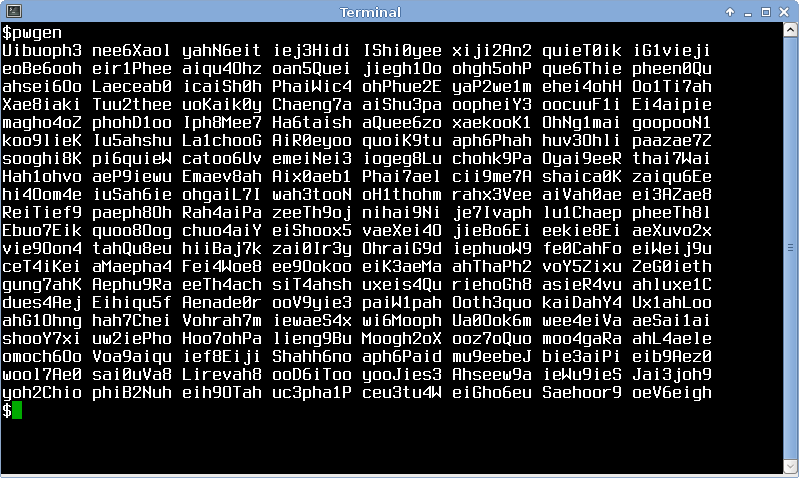
- #Man pwgen how to#
- #Man pwgen install#
- #Man pwgen 64 bits#
- #Man pwgen portable#
- #Man pwgen password#
#Man pwgen password#
Since the passwords are random and long, you will probably only want to use pwmake with a password manager. After generating the password, you can use pwscore or pam_pwquality, two other utilities in libpwquality-tools, to check the strength of the generated password. The entropy is generated by /dev/urandom. However the number of bits can go even higher, if desired.
#Man pwgen 64 bits#
The man page suggests 64 bits when attackers do not have direct access to the password hash file, or 80-128 bits when attackers might have access or the password is used as an encryption key. It includes only one option: the amount of entropy bits used to generate the password ( Figure 2). Pwmake is a simple utility available in the libpwquality-tools package. If the password you are generating is important to you, you might want to use another password generator. However, using traditional password standards, an increasing number of experts suggest a minimum of 12 characters. That used to be an adequate length and still provides moderate security. PWGen provides a wealth of options, but notice that its passwords are eight characters long. You can also control the number of results with -num-passwords=NUMBER ( -N). However, you can use -lines ( -l) to display results one per line. Results are displayed in columns by default. For maximum security, specify -secure ( -s), which will maximize the mixture of characters ( Figure 1). This pattern can be modified by the options in Table 1 to produce an easier to remember password, but remember that excluding types of characters will probably result in a weaker password. It is based on the traditional password advice, providing eight character strings for passwords that include lower- and uppercase letters, numerals, and special characters. PWGen is one of the oldest password generators for Linux. Many implement traditional answers, but others are starting to implement ways of making passwords more memorable, either by tweaking tradition in various ways or taking a new approach altogether. However, that doesn't stop the developers of password generators illustrating possible solutions. Yet even if you choose unique passwords in every circumstance, how random can passwords invented by one person truly be? And what strategies can you use to make random passwords memorable? A password manager can ease the daily burden, but what happens if your password manager becomes corrupted? What were simple issues a couple of decades ago have become complicated today, with no easy answers.Īsk security experts, and the answers to these questions can be conflicting. It's enough to make users choose convenience over security and use the same password everywhere – which is just about the worst thing you can do. It is based on the traditional password advice, providing eight character strings for. Don't strip binary, since rpmbuild will do it.How should you generate passwords? You probably know the standard advice of using a variety of characters, but the resulting passwords are hard to remember, especially since the recommended length keeps getting longer as cracking methods become more sophisticated. Build a mobile app that integrates with a Firebase database so that data is persisted across sessions. PWGen is one of the oldest password generators for Linux 1. * Tue Fedora Release Engineering - 2.06-3
#Man pwgen portable#
You need local installation rights (use the Portable version on the right. * Thu Fedora Release Engineering - 2.06-4 Download the EXE file above, run it and follow the steps of the installation program. * Sun Fedora Release Engineering - 2.06-5 * Wed Fedora Release Engineering - 2.06-6 * Sat Fedora Release Engineering - 2.06-7 * Sat Fedora Release Engineering - 2.06-8
#Man pwgen how to#
Here is how to make a four passwords to choose from, each being 18 letters in length: Code: Select all.
#Man pwgen install#
Install the pwgen (password generator) via command line: Code: Select all. * Thu Fedora Release Engineering - 2.06-9 Luckily, linux makes this very easy to do. * Sun Fedora Release Engineering - 2.06-10 * Sat Fedora Release Engineering - 2.06-11

* Sun Fedora Release Engineering - 2.06-12 * Thu Fedora Release Engineering - 2.07-2 * Thu Fedora Release Engineering - 2.07-3 * Sat Fedora Release Engineering - 2.07-4 * Thu Fedora Release Engineering - 2.07-5 * Thu Fedora Release Engineering - 2.07-6 * Fri Fedora Release Engineering - 2.07-7 * Fri Fedora Release Engineering - 2.07-8 Upper case letters and numericĭigits are placed in a way that eases memorizing the password. Upper case, lower case and numeric digits. Passwords contain either only lowercase letters, or upper and lower case, or Pwgen generates random, meaningless but pronounceable passwords. 7 RPM for x86_64 From EPEL 7 for x86_64īuild host:


 0 kommentar(er)
0 kommentar(er)
